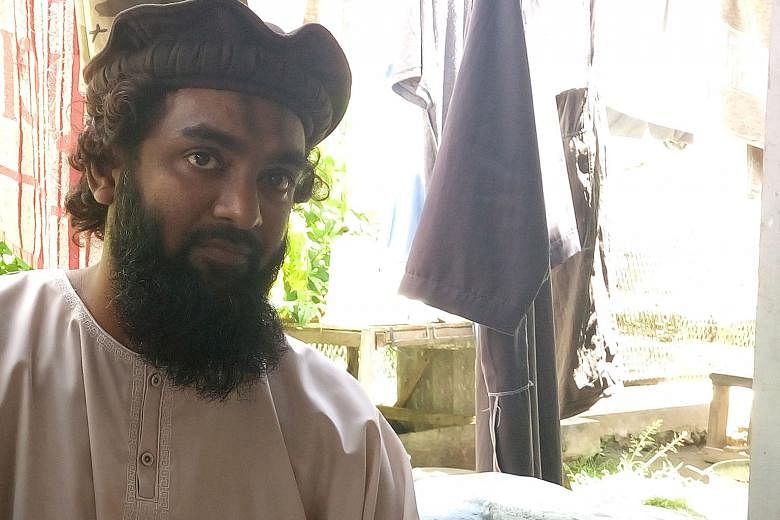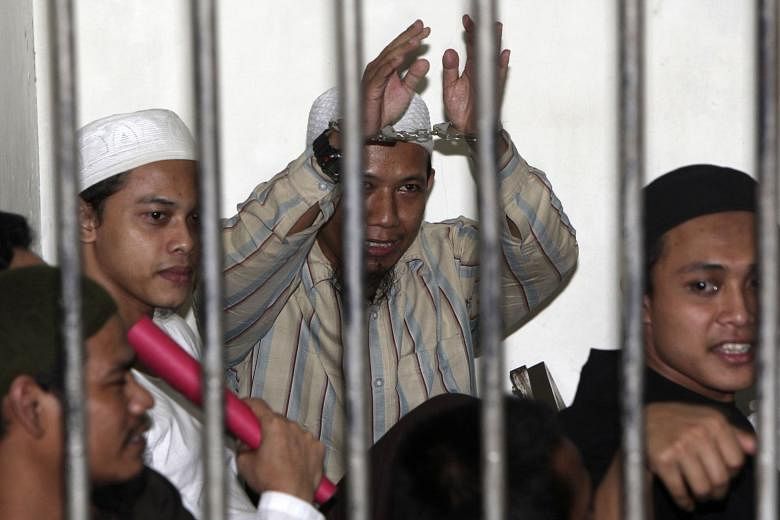It is becoming more evident that the Jan 14 terror attack in Jakarta was initiated from prison instead of the battlefields in Syria as it was first believed.
The chief architect is a recalcitrant Islamic ideologue named Aman Abdurrahman, now serving time in a maximum-security prison for his role in setting up a Jemaah Islamiah (JI) paramilitary training camp in Aceh in 2009.
Recent revelations by the Indonesian police and National Intelligence Agency (BIN) indicate that Aman had authorised the strike on the capital. This latest development comes after the police had initially tagged former Indonesian terror inmate Muhammad Bahrun Naim as the orchestrator of the siege, which left eight, including the four attackers, dead. Bahrun is now believed to be fighting for the Islamic State in Iraq and Syria (ISIS) militant group in Raqqa, Syria.
The "Jakarta Four" - comprising Sunakim alias Afif, Muhammad Ali, Dian Joni Kurniadi and Ahmad Muhazin - were members of different extremist groups in Indonesia, consolidated under the Jemaah Anshar Khilafah (JAK) terror network last year. All four visited Aman at least three times before the attack.
It is unclear if Aman is the leader of the JAK, said Ms Sidney Jones, from the Jakarta-based Institute for Policy Analysis of Conflict, but she added that Aman "is clearly the group's dominant figure".
Police chief Badrodin Haiti said Aman is regarded as emir or the leader of the JAK, and it is in that capacity that he gave his blessings for last month's attack.
This theory, that it was Aman and not Bahrun behind the attack, was also supported by a BIN official, who told Tempo magazine the Jakarta Four had received orders from Aman to strike.
The Sunday Times was at Nusakambangan island prison complex in Central Java last month to see Aman but he declined to be interviewed.
A chance meeting there with Singaporean Mohammad Hassan Saynudin, however, offered a glimpse of what life is like for terror convicts and explains how it might be possible for Aman to maintain his influence over militants outside prison and, possibly, order the Jakarta hit from behind bars.
Hassan, 42, better known by his nom de guerre Fajar Taslim, is serving an 18-year jail term for killing a Christian school teacher and his part in a terror attack. But he is able to make regular phone calls and spends time outside his cell. He also enjoys fortnightly visits by his Indonesian wife and three children.
"I prefer to be jailed here because you can still meet people," said Hassan, who is linked to Singaporean terrorist Mas Selamat Kastari.
Convicted extremists in Nusakambangan, such as Aman and JI spiritual leader Abu Bakar Bashir, enjoy similar privileges, if not more.
The Straits Times learnt that Aman received visitors almost every Tuesday and Thursday, the visiting days, inside his 5m-by-15m cell that he shares with four others.
Among his cellmates are JI bombmaker Musola alias Muhamad Ibrahim Musa and Iwan Darmawan Muntho alias Rois, who helped JI operative Noordin Top bomb the Australian Embassy in Jakarta in 2004.
Aman's visitors included former terror convicts and his JAK followers. They usually stayed for the entire 21/2 hours allowed for visits, often praying and eating together.
Prison records seen by The Sunday Times showed that Sunakim had signed in on Sept 15, last year to meet Aman's cellmate, Musola. This was purportedly done to mask his meeting with Aman, who is his mentor. Tempo reported that this was Aman's second of many meetings in his cell with Sunakim and other members of the Jakarta Four. The first was on May 4, last year, when the guest book was signed by Dian.
According to the BIN official, Aman would, over the course of the meetings, preach to the four men to strengthen the resolve of the four men to mount a jihad, while Rois taught them the art of militancy.
This was consistent with Aman's activities when he was first sent to Cipinang Prison in East Jakarta and later to Nusakambangan, said Ms Susan Sim, vice-president for Asia at New York-based The Soufan Group, a strategic security consultancy.
"Twice a week, his followers come from all over the country, taking long bus rides and then the prison ferry to the island," she said in a report co-written with Mr Noor Huda Ismail of the Institute for International Peace Building. "They also recorded his sermons and distributed them as MP3 files... from prison to prison, so other terrorist inmates became familiar with his ISIS ideology, even if they have never met him."
In the days leading up to the attack, Aman also issued a fatwa, or decree from prison. The message, which began circulating among Indonesian militants via mobile messenger applications from Jan 5, Aman's birthday, called for them to emigrate to ISIS' caliphate. He also urged those unable to make the journey to, among other things, take up arms and wage a jihad at home, adding that "if you cannot do that, then what is the meaning of bai'at?"
Bai'at is an oath of allegiance.
The police have yet to charge Aman in connection with the Jan 14 attacks. Investigations are still ongoing. But the government is preparing to isolate Aman and others like him who pose a risk, as well as limit their visitation rights in a bid to cut off their influence.
Coordinating Minister for Political, Legal and Security Affairs Luhut Pandjaitan on Thursday said Nusakambangan inmates have since been divided into groups such as ideologists, militants and sympathisers. "This has been done so that no more lecturing can occur during imprisonment."
TOMORROW Fighting terror at the grassroots


